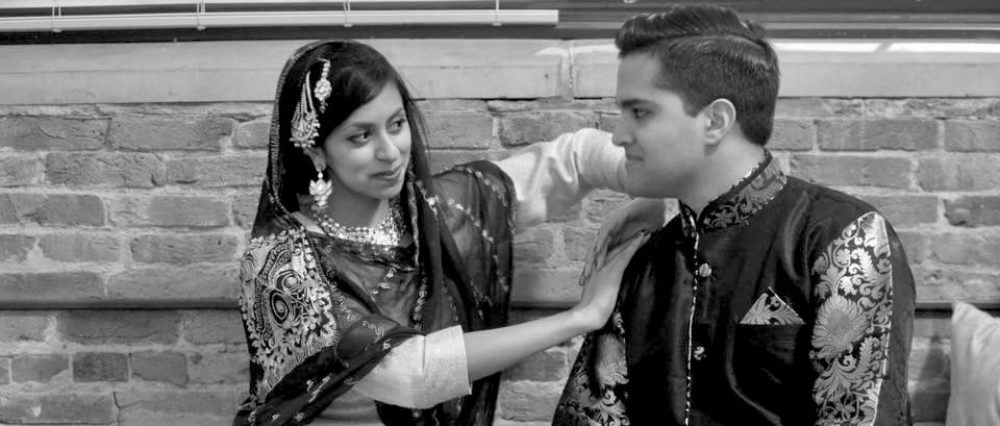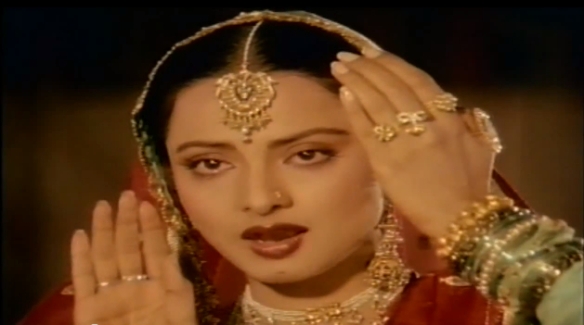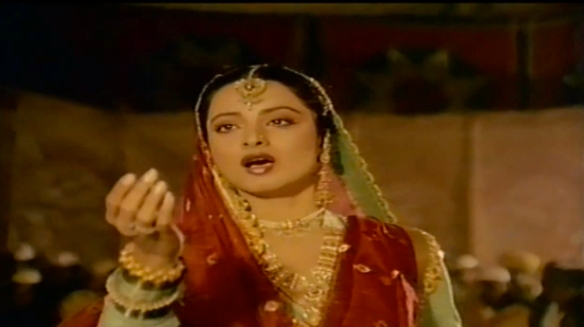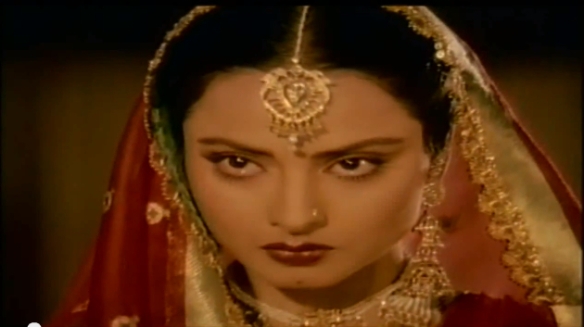We next present the beautifully tragic lyrics and English translation of “Yeh Kya Jagah Hai Doston” from Umrao Jaan (1981). Umrao Jaan is a heart-breaking film with depths more profound than the glittery tawaif dances it showcases. Based on the 1899 Urdu novel by Mirza Hadi Ruswa entitled, “Umrao Jaan Ada,” the 1981 film stays largely true to the original text.
Delving into the decadence of 19th century Lucknowi society, Umrao Jaan Ada portrays the rituals of a fascinating culture marked by luxury and oppression. I first read Ruswa’s novel during my junior year of college in Urdu class and fell in in love with the resilience of the story’s heroine.
Interestingly, the framing of the 1981 Muzaffar Ali-directed film differs from the novel, told as a chronological account instead of a reminiscence. For me, this changes the tone of the film entirely: in the novel, the audience knows that although Umrao Jaan has suffered greatly in her lifetime, she eventually finds the peace and independence she deserves.
In the film, however, Umrao Jaan’s fate is unclear. We are left only with the stirring final image of her somber reflection in the mirror of her childhood home—an identity so long defined by others now confronted by its owner. Knowing these alternate endings colours the implications of Asha Bhonsle’s emotional “Yeh Kya Jagah Hai Doston” preceding them.
Just prior to the film’s finale, Umrao Jaan (portrayed by Rekha) is asked to perform a song in her own town of Faizabad where she is now regarded as a pariah or stranger. The poetry that results in “Yeh Kya Jagah Hai Doston” evokes that sense of loss and confusion—a blameless fall from Eden with no path forward. As her own mother listens quietly outside the tent, Umrao Jaan’s addressing the unfamiliar gathering as “doston” becomes perhaps less ironic and more of an earnest plea.
Written by Shahryar with music by Khayyam, “Yeh Kya Jagah Hai Doston” is a counterpoint to the film’s earlier musical gems “In Ankhon Ki Masti” and “Dil Cheez Kya Hai.” With no ulterior motives, Umrao Jaan at last sings and dances as herself, voicing the real emotions within her heart. Many consider this song to be the film’s greatest composition.
We hope you enjoy our lyrics and translation to the soulful swansong, “Yeh Kya Jagah Hai Doston” below! Let us know your favorite Umrao Jaan moment in the comments!
Yeh Kya Jagah Hai Doston Lyrics and Translation:
Yeh kyaa jagah hai dosto.N?
What place is this, friends?
Yeh kaunsaa dayaar hai?
What kind of world is this?
Had-e-nigaah tak jahaa.N, ghubaar hii ghubaar hai
Where, as far as the eye can see, there are only dust storms
Yeh kis maqaam par hayaat mujhko lekii aa gayii?
To what realm has life brought me?
Na bas khushii pe hai jahaa.N, na gham pe ikhtiyaar hai
In this place I have no control over my happiness, and no choice in my sorrow
Tamaam umr ka hissaa maa.ngtii hai zindagii
Life demands an account of all my years
Yeh meraa dil kahe to kyaa? Yeh khud se sharmasaar hai
What will this heart of mine answer? It is so ashamed of itself
Bulaa rahaa hai kaun mujhko chilmano.N ki us taraf?
Who is calling me from the other side of those blinds?
Mere liye bhi kyaa koi udhaas beqaraar hai?
Is anyone there for me who is restless in sorrow?
Yeh kyaa jagah hai dosto.N?
What place is this, friends?
Yeh kaunsaa dayaar hai?
What kind of world is this?
Had-e-nigaah tak jahaa.N, ghubaar hii ghubaar hai
Where, as far as the eye can see, there are only dust storms
Glossary:
jagah: place; dayaar: world, region; had-e nigaah tak: until the limits seen by the eye; ghubaar: dust storm; maqaam: realm; hayaat: life; bas: power; khushii: happiness; gham: sorrow; ikhtiyaar: choice, tamaam umr: whole life, all the years; hissaa: account; zindagi: life; khud: self; sharmasaar: embarrassed, ashamed; chilman: curtains made of reeds, blinds; udhaas: sorrow; beqaraar: restless
As I read the pages of Ruswa’s novel, I was so struck by his descriptions of the admirable training in classical arts given to students of the kothe. These talents that in today’s society would be so valued as the pinnacle of culture, instead branded these women for a lifetime of ignominy. Today such diligence in the study and practice of classical voice, dance, and poetry is so rare and impressive!
For the grammar junkies among us, you may wonder why the “jagah” in this song is pronounced to rhyme with “yeh” instead of “kyaa.” Strictly speaking, the Lucknowi pronunciation of the word is the long “aah,” however, for poetic fluidity, Asha Bhonsle pronounces it here in the alternate form. Regional variants exist in the Hindustani language for similar words such as subah and vajah!
– Mrs. 55





These songs were probably Asha’s finest moments as well as Rekha’s. You are right they are very admired today for the artistic value rather than the shameful position they put the women into in that era. A magnificent movie and beautiful portrayal. It is the classical arts of India that we most need to preserve and showcase more in our movies even now before our great culture gets completely diluted and lost.
Well said! Their artistry was incomparable, even if glamorized by the film, and I wish we saw more of it in the modern era.
Your comment about Asha’s pronunciation of “jagah” is interesting. Even though I also pronounce it with the long “aah” I’ve been under the impression that many words that are written with the “h” sound and proceeded and followed only by the inherent “uh” vowel rather than a written maatra vowel, like یہ / यह or پہلا / पहला are pronounced with the “eh” sound instead of the “uh” sound. It’s one of the few nuances about Hindi/Urdu in which the word isn’t pronounced exactly how it’s written. I haven’t noticed the regional variants regarding vajah and subah, so I’ll have to start listening for that!
Yes, although most of the Hindi language is read as it’s pronounced, there are some fascinating exceptions–including “yeh” as you’ve pointed out and even stranger, “woh”! Pehlaa is a word that changes based on the gender or plurality of what it describes, but jagah does not quite follow the convention (eg. a pronunciation of “jageh” does not necessarily imply a multiplicity of places). We at Mr. and Mrs. 55 love these kinds of grammar nuances in the Hindustani language!
Awesome – love it. Thank you so much for this translation. My father would say Urdu is a language of royalty. Indeed – a rich, polished, fine language. Such a heartbreaking song..such a great translation. Now I want to watch the movie…
Please consider adding g+ easier to rate I enjoyed the wonderful written translation by Mrs 55 keep on keeping on
Thanks for the comment! You can share any of our posts on google+ by clicking on the icon at the bottom of the post!
Excellent picture of Mr and Mrs 55 but beige umbrella really? Please take again with black or blue umbrella. Beautiful couple. =)
This film is excellent, as well as heartbreaking. Rekha is stunning in her performance, and Asha’s voice is beautiful, and full of emotion. One of the draws to this song is also seeing the elderly man who is moved by what he sees and hears at the beginning of the song; it about brings me to tears. Thank you for the English translation. I enjoy your website because you include insight, and interesting facts, etc. Thank you!
We feel the same way about this song and are glad you enjoyed our translation! Thank you for reading!
So beautifully translated with explanation it brought the movie, emotions, and beauty of Urdu poetry to life. Thanks.
beautiful translation of a beautiful song
This is one of my favourite Indian films, and the book too. It has been really interesting to read your comments, and to have the translations of some of the songs. Thank you so much – it will add to my pleasure.
Thank you
Thank you! well written!